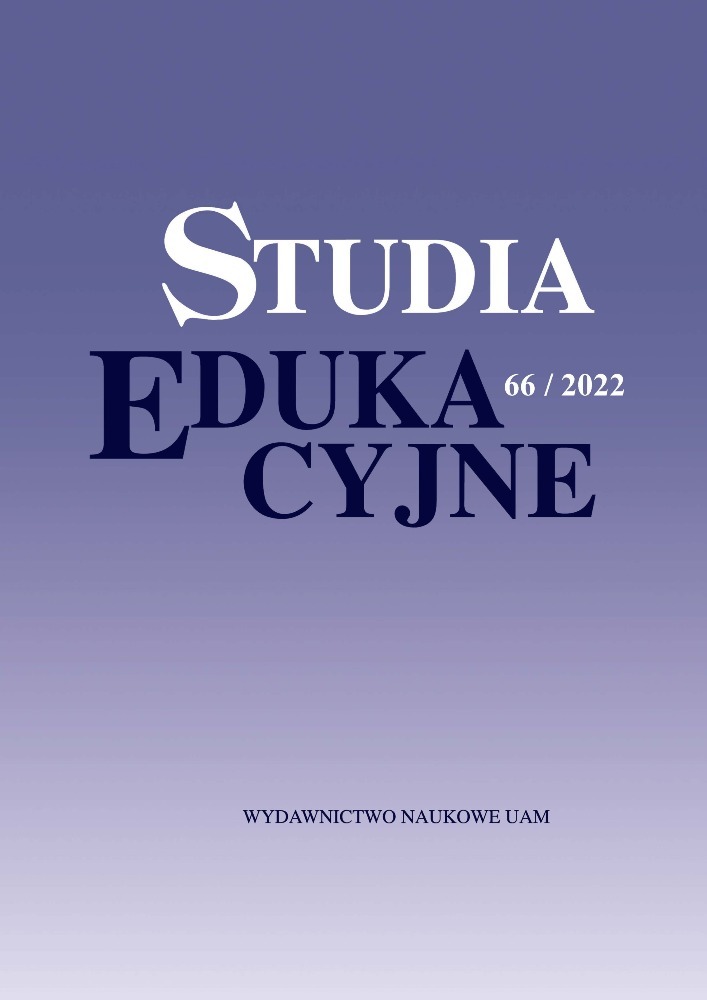Abstract
The paper presents arguments on profound and diverse student-teacher education concentrated on sustainable development as a rational way to combat Anthropocene damage and destruction. It means coping with destructive ecological changes and, more widely, with social deformations that revised educational approaches and paradigms may heal. They refer to the concept of reimagination in education. Thus, there is a considerable need to work out some valid, understandable and socially accepted teaching-learning pedagogies that would make the process of student-teacher education comply with contemporary and future expectations and challenges. Making the idea of “Think globally, act locally” practically achievable, present and future teachers should learn to perceive each school/academic topic as a multifaceted issue, referring to the four pillars of sustainable education. It entails using some new concepts of professional development, like deep learning or experiential learning, along with the awareness of the future of education. A new social contract for education considers the circular process of human development and eco- logical regrowth, which needs to introduce truly “holistic strategies”. They refer to six global competencies (Character, Citizenship, Collaboration, Communication, Creativity, and Critical Thinking) and five principles of student-teacher growth (Combination of pedagogies, Connoisseurship of expert teachers and learning communities, Content inherent in all teaching and learning, The reach of context, and Making change happen) as well as to some earlier sustainability transformation concepts included in sustainable development documents from previous decades. While the conviction of teachers’ undeniable role in building a more balanced life is constantly increasing, processes of student-teacher education for sustainability are too slow. They have to accelerate and receive priority. Such approaches need to rethink course curricula and syllabi and “make” teachers assume a new and varied perspective on planning, implementation and assessment. One of them is the eponymous “Project X”, which refers to the concept of Project Y suggested in some UNESCO teacher manuals and first mentioned during DESD. It enlarges the three-dimension perspective by adding the cultural pillar. The issue of perceiving a teaching-learning problem simultaneously from four perspectives (natural, cultural, social, and economic) enhances the range of possible questions and interpretations, evokes deeper individual reflection, and refers to students’ life experiences and expectations. Planning such a highly complex and complementary teaching-learning strategy motivates students (present-day and prospective teachers) to engage them in learning and makes the work more intriguing and challenging. The presentation of a sample of the “Project X” realisation as an example of an innovative learning strategy proves education’s strength and creative possibilities for sustainable development in teacher learning as constructive, beneficial and fruitful pedagogical approaches
References
Benner S., Lax G., Crutzen P.J., Paul J. Crutzen and the Anthropocene: A New Epoch in Earth’s History, Cham: Springer Nature, Switzerland AG 2021. DOI: https://doi.org/10.1007/978-3-030-82202-6
Crutzen P.J., Stoermer E.F., The ‘Anthropocene’ 2000, [in:] The Future of Nature, eds. L. Robin, S. Sörlin, P. Warde, Yale University Press, New Haven, USA 2013.
Elhussein G., Till A.L., Zahidi S., Schools of the Future: Defining New Models of education fort the Fourth Industrial Revolution, World Economic Forum, Geneva, Switzerland 2020.
Facer K., Futures in education: Towards and ethical practice, UNESCO, Paris 2021, Accessed June 17, 2022. https://unesdoc.unesco.org/ark:/48223/pf0000375792.locale=en.
Ferguson T., Carmel R., Cook L.D., Teachers’ perspectives on sustainable development: the im- plications for education for sustainable development, Environmental Education Research, 2021, 27, 9. DOI: https://doi.org/10.1080/13504622.2021.1921113
Fullan M., Scott G., Education PLUS: The world will be led by people you can count on, including you!, Collaborative Impact SPC, Seattle – Washington 2014.
Fullan M., Quinn J., McEachen J.J., Deep learning: Engage the World, Change the World, a SAGE Publishing Company, Dallas, USA: CORWIN 2018.
Gidley J.M., Futures of Education for Rapid Global-Societal Change, [in:] There’s a Future: Vi- sions for a Better World, BBVA, Madrid 2012.
Hickel J., Less Is More: How Degrowth Will Save the World, Windmill Books, London 2021. International Commission on the Futures of Education, Reimagining Our Futures Together: A new social contract for education, UNESCO, Paris 2021.
International Commission on the Futures of Education, Transforming education together for just and sustainable futures, UNESCO, 2022, Accessed May, 18, 2022. https://unesdoc.unesco.org/ark:/48223/pf0000381984.
Lotz-Sisitka H., UNESCO World Conference on Education for Sustainable Development Conference Report, Accessed October, 18, 2015. http://unesdoc.unesco.org/imag-es/0023/002328/232888E.pdf.
McKeown R., Education for Sustainable Development. Toolkit, Learning and Training Tools No. 1, UN DESD, Paris 2005-2014, Education for Sustainable Development in Action, UNE- SCO Education Sector, 2006. https://unesdoc.unesco.org/ark:/48223/pf0000152453.
MEN, Rozporządzenie Ministra Edukacji Narodowej z 30 stycznia 2018 r. w sprawie podstawy programowej kształcenia ogólnego dla liceum ogólnokształcącego, technikum oraz branżowej szkoły II stopnia, Warszawa 2018, Accessed June 28, 2022; http://prawo.sejm.gov.pl/isap.nsf/download.xsp/WDU20180000467/O/D20180467.pdf.
Moore J.W., Capitalism in the Web of Life: Ecology and the Accumulation of Capital, Verso, London 2015.
OECD, Building the future of education, 2021; https://www.oecd.org/education/fu-ture-of-education-brochure.pdf.
Paniagua A., Instance D., Teachers as Designers of Learning Environments: The Importance of Innovative Pedagogies, Educational Research and Innovation, OECD Publishing, Paris 2018, DOI: https://doi.org/10.1787/9789264085374-en
Poeck K., Östman Van L., Öhman J. eds., Sustainable Development Teaching: Ethical and Political Challenges, Routledge, London – New York 2019. DOI: https://doi.org/10.4324/9781351124348-4
Rieckmann M., Education for Sustainable Development in Teacher Education. An International Perspective, [in:] Environmental Education, ed. S. Lahiri, Studera Press, Delhi 2019.
Rogalska-Marasińska A., Edukacja międzykulturowa na rzecz zrównoważonego rozwoju, Wy- dawnictwo Uniwersytetu Łódzkiego, Łódź 2017. DOI: https://doi.org/10.18778/8088-671-1
UNESCO, Bonn Declaration, World Conference on Education for Sustainable Development 2009, Accessed June 12, 2022; https://unesdoc.unesco.org/ark:/48223/pf0000188799/PDF/188799eng.pdf.multi.
UNESCO, Education for Sustainable Development: A Roadmap, Paris 2020, Accessed May, 20, 2022; https://unesdoc.unesco.org/ark:/48223/pf0000374802.locale=en.
UNESCO, Education for Sustainable Development. Sourcebook. Learning & Training Tools No 4-2012, Paris 2012, Accessed May 3, 2022; https://unesdoc.unesco.org/ark:/48223/pf0000216383.
UNESCO, Guidebook on Education for Sustainable Development for educators. Effective teaching and learning in teacher education institutions in Africa, Paris 2018, Accessed May, 18, 2022; https://www.adeanet.org/en/system/files/resources/guide_on_esd_for_ed-ucators.pdf.
UNESCO/Rhodes University, Sustainability Starts with teachers: Capacity Building Pro- gramme for Teacher Educators on Education for Sustainable Development, 2020; https://sustainabilityteachers.org/.
UNESCO, The Initiative, Futures of Education, 2019; https://en.unesco.org/futuresofedu-cation/initiative.
UNESCO, Three Questions to Transform Education, Futures of Education, 2019; https://en.unesco.org/futuresofeducation/three-questions
License
Copyright (c) 2023 Aneta Rogalska-Marasińska

This work is licensed under a Creative Commons Attribution 4.0 International License.

